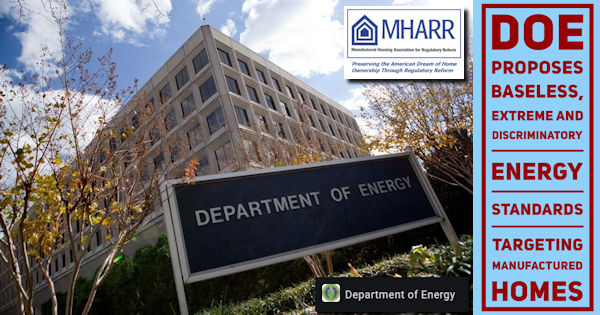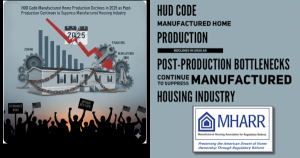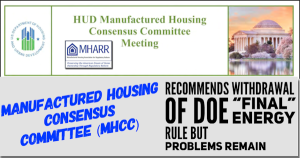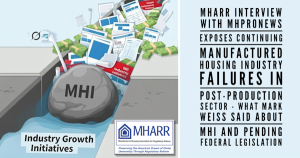DOE Proposes Baseless, Extreme and Discriminatory Energy Standards Targeting Manufactured Homes

Washington, D.C., August 16, 2021 – The U.S. Department of Energy (DOE) has released a “prepublication” version of its second round of proposed “energy conservation” standards for HUD Code manufactured homes. See, communication attached. Publication of the Supplemental Notice of Proposed Rulemaking in the Federal Register will follow. Earlier proposed DOE manufactured housing energy standards, put forward as an attempted “midnight regulation” during the waning days of the Obama Administration in 2016, were ultimately withdrawn by President Trump, following forceful opposition by MHARR.
The new proposed standards, based on the 2021 version of the International Energy Conservation Code (IECC) maintained by the International Code Council (ICC), are an outgrowth of the Energy Independence and Security Act of 2007, which essentially transferred responsibility for the development of manufactured housing energy standards from the U.S. Department of Housing and Urban Development (HUD) – which regulates all other aspects of manufactured housing construction and safety – to DOE, an agency heavily influenced by energy special interests, including extremist “climate” ideologues and product suppliers seeking to enhance sales via self-serving, abusive regulatory mandates.
MHARR, which spearheaded industry opposition to the 2016 proposed DOE manufactured housing energy standards developed through a contorted, illegitimate and deceitful DOE “negotiated rulemaking” process – which it alone opposed from day-one — will once again aggressively oppose these proposed standards, which are unnecessary, needlessly-costly, discriminatory, and would ultimately exclude millions of lower and moderate-income American families from the manufactured housing market, from homeownership altogether, and from all of the social and economic benefits of homeownership.
As MHARR has already demonstrated in preliminary “scoping” comments submitted to DOE on August 3, 2021, high-cost energy standards for manufactured homes are totally unnecessary, insofar as whole-home energy usage by manufactured homes and related consumer costs – as confirmed by the most recent U.S. government data – already fall well below energy operating costs for all other types of housing for all types of home energy sources tracked (i.e., fuel oil, electricity and natural gas). Furthermore, based on 2021 IECC purchase price and market-exclusion metrics developed by the National Association of Home Builders (NAHB), the IECC 2021-based DOE proposed standards could increase the cost of double-section manufactured homes by nearly $13,000.00 per home (without even considering the impact of testing, regulatory compliance and enforcement costs), while excluding nearly 7 million American families from the mainstream HUD Code manufactured housing market. This exclusionary impact, moreover — again as shown by U.S. government data — would fall most heavily on racial and other minorities who, according to a 2021 Consumer Financial Protection Bureau (CFPB) report, are “overrepresented” among potential chattel-based manufactured home borrowers already rejected at a rate disproportionately-higher than sit-built loan applicants. Such a racially-disparate impact would fly in the face of Biden Administration Executive Orders and policies mandating the consideration of “racial equity” and “economic justice” in all such matters.
Even worse, the new energy standards, as required by EISA, would become progressively more stringent and costly, excluding ever-growing numbers of Americans from the manufactured housing market and from homeownership altogether, while undermining the purchase price affordability of manufactured housing, in direct violation of existing federal law. Furthermore, while proponents of excessive and destructive energy regulation seek to attribute alleged “life-cycle” cost savings to such standards, the fact of the matter is that there are – and will be – no “life-cycle” savings of any kind (and, indeed, no “life-cycle” at all) for the millions of Americans totally excluded from the market by exploding purchase price increases attributable to the new “standards.” Any claim of “life-cycle” cost savings for this massive cohort of excluded consumers would be fraudulent and deceitful.
Written comments in response to the DOE proposed rule will be due within 60 days of the proposal’s publication in the Federal Register. MHARR encourages all industry members and organizations to submit comments opposing these draconian and destructive proposed standards. MHARR’s comments, as usual, will be filed in advance of the [insert] deadline and will be available for reference or citation by other commenters.
In Washington, D.C., MHARR President and CEO, Mark Weiss, stated: “DOE’s proposed manufactured housing energy standards would slam the door shut on homeownership for millions of Americans, including millions of lower and moderate-income families and members of minority communities who rely on the affordability of mainstream manufactured housing the most. This harsh, cruel and needless attack by the Administration on hard-working American families – who already pay less for energy in manufactured homes than other types of homes – seeks to combat “climate change” on the backs of the working poor, denying them one of the fundamental basics of life, a decent home, while ‘woke’ climate elitists spew greenhouse pollutants from private jets, huge estates and energy-guzzling vehicles, among other things. With an affordable housing crisis already underway, needlessly putting homeownership beyond the reach of millions more Americans is not smart, is not legitimate and is morally indefensible. MHARR has – and will continue — to oppose this callous mandate through all available means.”
The Manufactured Housing Association for Regulatory Reform is a Washington, D.C.-based national trade association representing the views and interests of independent producers of federally-regulated manufactured housing.

Washington, D.C., August 16, 2021 – The U.S. Department of Energy (DOE) has released a “prepublication” version of its second round of proposed “energy conservation” standards for HUD Code manufactured homes. See, communication attached. Publication of the Supplemental Notice of Proposed Rulemaking in the Federal Register will follow. Earlier proposed DOE manufactured housing energy standards, put forward as an attempted “midnight regulation” during the waning days of the Obama Administration in 2016, were ultimately withdrawn by President Trump, following forceful opposition by MHARR.
The new proposed standards, based on the 2021 version of the International Energy Conservation Code (IECC) maintained by the International Code Council (ICC), are an outgrowth of the Energy Independence and Security Act of 2007, which essentially transferred responsibility for the development of manufactured housing energy standards from the U.S. Department of Housing and Urban Development (HUD) – which regulates all other aspects of manufactured housing construction and safety – to DOE, an agency heavily influenced by energy special interests, including extremist “climate” ideologues and product suppliers seeking to enhance sales via self-serving, abusive regulatory mandates.
MHARR, which spearheaded industry opposition to the 2016 proposed DOE manufactured housing energy standards developed through a contorted, illegitimate and deceitful DOE “negotiated rulemaking” process – which it alone opposed from day-one — will once again aggressively oppose these proposed standards, which are unnecessary, needlessly-costly, discriminatory, and would ultimately exclude millions of lower and moderate-income American families from the manufactured housing market, from homeownership altogether, and from all of the social and economic benefits of homeownership.
As MHARR has already demonstrated in preliminary “scoping” comments submitted to DOE on August 3, 2021, high-cost energy standards for manufactured homes are totally unnecessary, insofar as whole-home energy usage by manufactured homes and related consumer costs – as confirmed by the most recent U.S. government data – already fall well below energy operating costs for all other types of housing for all types of home energy sources tracked (i.e., fuel oil, electricity and natural gas). Furthermore, based on 2021 IECC purchase price and market-exclusion metrics developed by the National Association of Home Builders (NAHB), the IECC 2021-based DOE proposed standards could increase the cost of double-section manufactured homes by nearly $13,000.00 per home (without even considering the impact of testing, regulatory compliance and enforcement costs), while excluding nearly 7 million American families from the mainstream HUD Code manufactured housing market. This exclusionary impact, moreover — again as shown by U.S. government data — would fall most heavily on racial and other minorities who, according to a 2021 Consumer Financial Protection Bureau (CFPB) report, are “overrepresented” among potential chattel-based manufactured home borrowers already rejected at a rate disproportionately-higher than sit-built loan applicants. Such a racially-disparate impact would fly in the face of Biden Administration Executive Orders and policies mandating the consideration of “racial equity” and “economic justice” in all such matters.
Even worse, the new energy standards, as required by EISA, would become progressively more stringent and costly, excluding ever-growing numbers of Americans from the manufactured housing market and from homeownership altogether, while undermining the purchase price affordability of manufactured housing, in direct violation of existing federal law. Furthermore, while proponents of excessive and destructive energy regulation seek to attribute alleged “life-cycle” cost savings to such standards, the fact of the matter is that there are – and will be – no “life-cycle” savings of any kind (and, indeed, no “life-cycle” at all) for the millions of Americans totally excluded from the market by exploding purchase price increases attributable to the new “standards.” Any claim of “life-cycle” cost savings for this massive cohort of excluded consumers would be fraudulent and deceitful.
Written comments in response to the DOE proposed rule will be due within 60 days of the proposal’s publication in the Federal Register. MHARR encourages all industry members and organizations to submit comments opposing these draconian and destructive proposed standards. MHARR’s comments, as usual, will be filed in advance of the [insert] deadline and will be available for reference or citation by other commenters.
In Washington, D.C., MHARR President and CEO, Mark Weiss, stated: “DOE’s proposed manufactured housing energy standards would slam the door shut on homeownership for millions of Americans, including millions of lower and moderate-income families and members of minority communities who rely on the affordability of mainstream manufactured housing the most. This harsh, cruel and needless attack by the Administration on hard-working American families – who already pay less for energy in manufactured homes than other types of homes – seeks to combat “climate change” on the backs of the working poor, denying them one of the fundamental basics of life, a decent home, while ‘woke’ climate elitists spew greenhouse pollutants from private jets, huge estates and energy-guzzling vehicles, among other things. With an affordable housing crisis already underway, needlessly putting homeownership beyond the reach of millions more Americans is not smart, is not legitimate and is morally indefensible. MHARR has – and will continue — to oppose this callous mandate through all available means.”
The Manufactured Housing Association for Regulatory Reform is a Washington, D.C.-based national trade association representing the views and interests of independent producers of federally-regulated manufactured housing.













